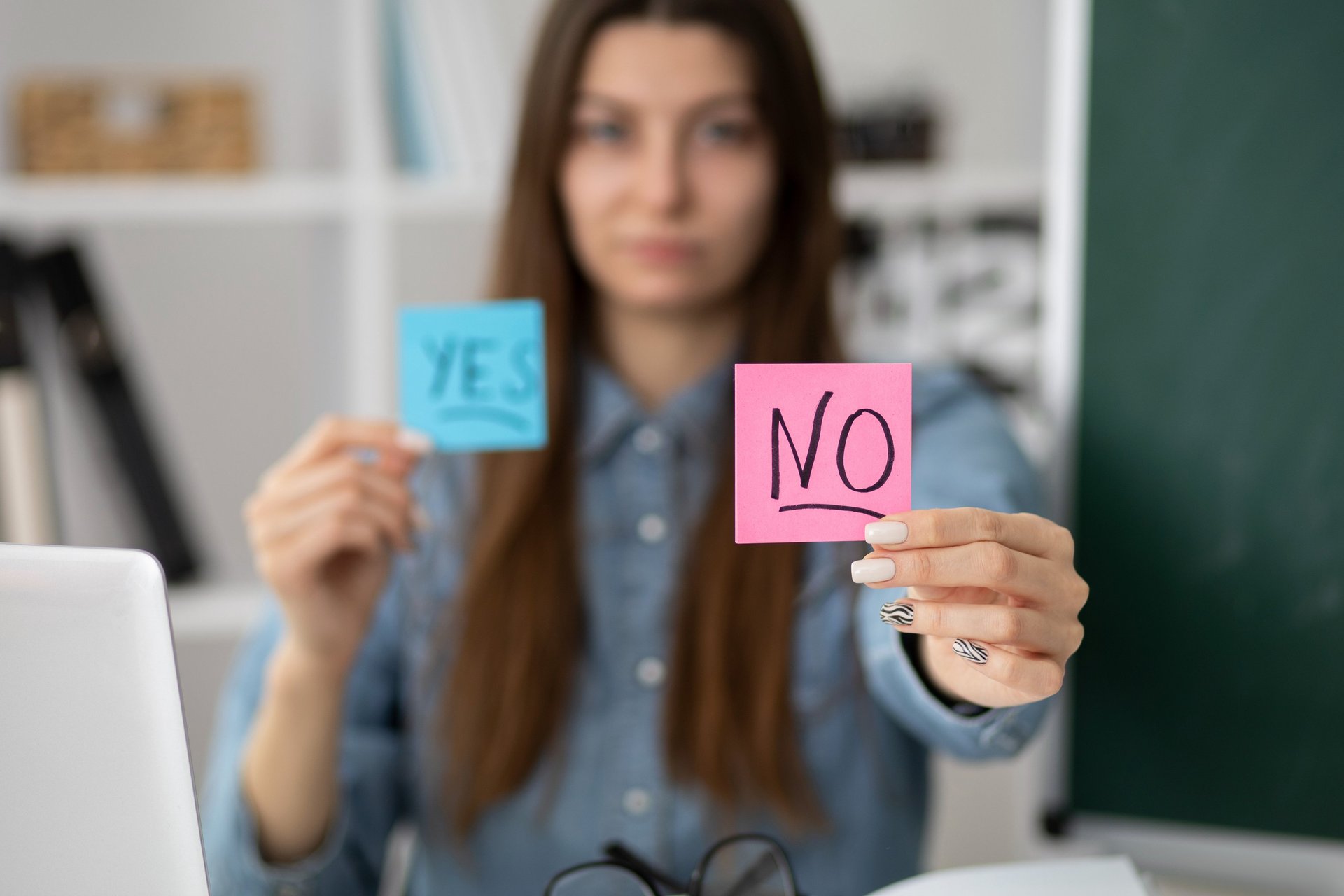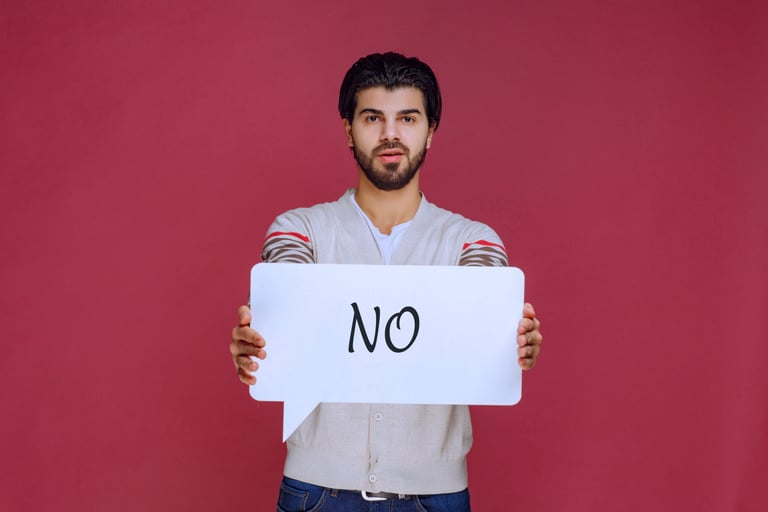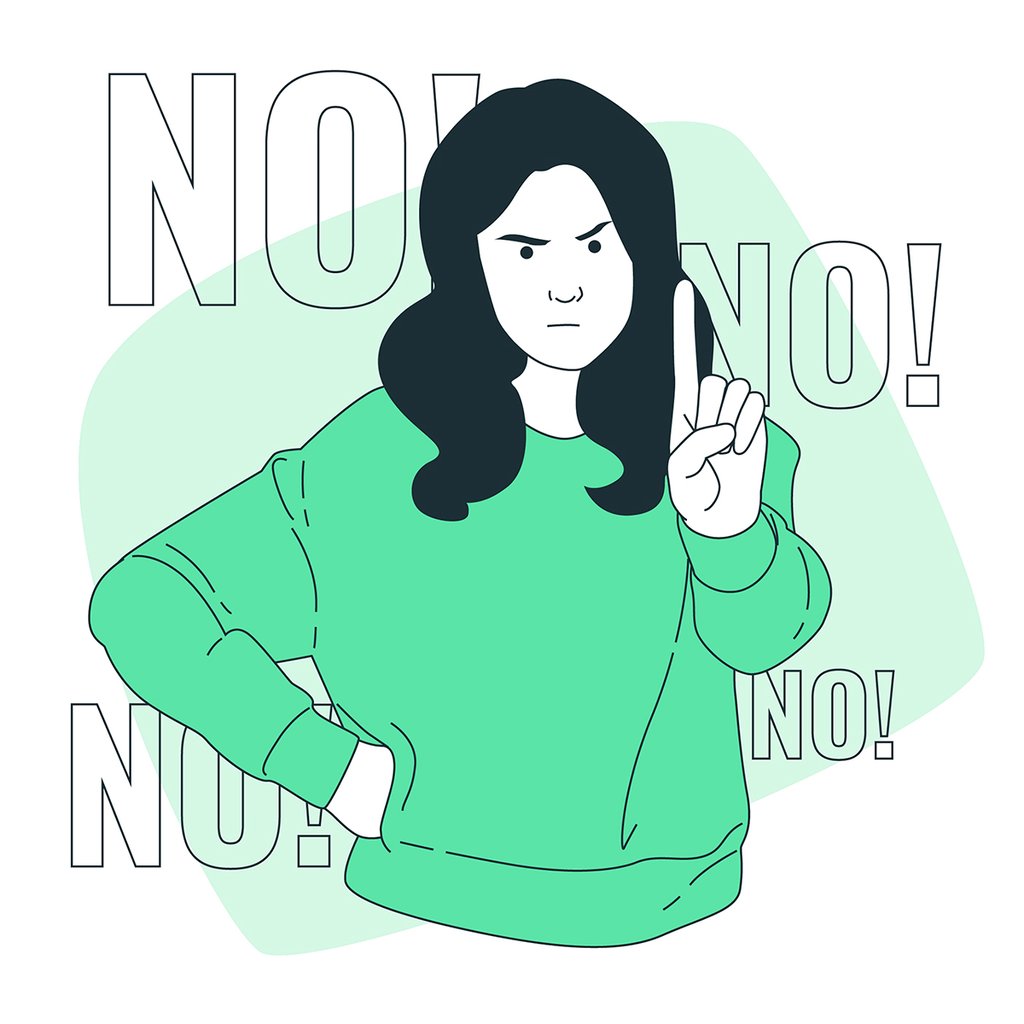Why Saying NO is Necessary for Our Mental Health?
Saying no is not about being rude and selfish. It is about self-care, setting limits, focus on what's important, minimize stress, and gain respect.
Faiza Zulfiqar
3/7/20256 min read


Always saying yes to everyone and everything may appear to be the correct thing to do, but it can harm our mental health. It is like juggling too many balls at once; after some time, something will fall. Doing so makes us confused, tired, and overwhelmed, leaving little time for ourselves.
The Power of Saying No
Saying no for your mental health is helpful for your general state of health. It is not just about turning down requests; it's about setting boundaries, protecting your time, and prioritizing your well-being. The following are the reasons why it matters:
1. Protect Your Time and Energy
Mastering saying no helps you better manage your time and energy. I remember I used to say yes to everything, thinking it made me a good person. However, it made me exhausted all the time. It harmed my health. Once I started setting limits, it allowed me to give more time to myself. Have you ever felt tired because you didn't say no? If so, you’re not alone—it’s a struggle for many of us. By setting some limits and boundaries, you can have enough energy to engage in things that truly matter like your hobbies, relaxation, and spending quality time with your friends and family. Setting boundaries for your mental health isn’t selfish. It means prioritizing your well-being.
2. Maintain Healthy Boundaries
Setting boundaries requires being aware of and committing to one's limitations. It's like constructing a barrier around your own time and energy. When you respect your boundaries, others are going to follow. This helps you keep control of your life and prevent feeling overburdened. Consider becoming the gatekeeper of your fortress. Sometimes you must set up the drawbridge and announce, “Sorry, the castle is closed today”.
Setting boundaries doesn’t mean you don’t care about others—it means you care about yourself too. When you constantly say yes to others, you might be saying no to your own needs. Healthy relationships thrive on mutual respect, and that includes respecting your limits. Is setting boundaries a challenge for you? It may be hard at first, but practice makes it easier.
3. Focus on What Truly Matters
When you say "no" to things you cannot do in your planned schedule, you get more time for what is important to you. Instead of feeling pressured by too many responsibilities and commitments, you will feel good to have more time and energy just for yourself. Consider having extra time to play with your children, read your favorite book, or take a relaxing walk in the park. In short, getting time to do whatever you want to do or make you feel good. Saying no to mental health allows you to free up some energy and concentrate on what makes you pleased.
Think also about your future goals. Are you giving up your dreams just to make others happy? Saying no helps you focus on what you love and grow as a person. Instead of always putting others first, spare time for what truly matters to you. How would you enjoy your extra time if you had it? Even just imagining doing your favorite things feels good—now imagine how amazing it would be if you did them!


4. Reduce Stress and Anxiety
Responding with a "yes" every time could result in unrealistic expectations. This can lead to great intense anxiety and stress. Balancing so much already in your life and then adding extra responsibilities from others can make you feel suffocated and harm your mental health. It is just like carrying too many carry bags at once. Yes, it gets exhausting. Every person possesses the right to respond by saying no, right? It is essential to prevent yourself from feeling drenched. Saying no for mental health helps you to breathe and do your tasks without feeling rushed or pressured.
Many people feel bad when they say no, but think about this—what’s worse, feeling guilty for a short time or tired and stressed for a long time? Taking care of your mental health means knowing when to stop. Saying no helps you keep a healthy balance between work, relationships, and your well-being.
What Happens if You Say No?
Saying no is not always simple and easy. At first, you may be worried about upsetting people or that they may see you badly. You may feel awful or concerned, especially if you are used to feeling good when you please people. When you say "no," you may face an immediate negative response, making you feel like an evil person. It's a bit difficult, but remember that your well-being comes first. Maybe someone you know feels let down because you can't help them move somewhere else, or your boss gets annoyed because you can't take on extra work. However, people will eventually come to understand and observe your boundaries. They will realize that you, like everyone else, have limitations. Most importantly, you will feel more in control and less anxious, which leads to longer-term happiness and health. Remember, you can't satisfy and please everyone, and that's completely fine.
Think of saying no as an act of self-respect. You’re choosing to honor your needs, allowing you to show up as your best self for others. When well-rested and stress-free, you can offer support in a way that feels good rather than forced.


Personal Experience
I used to be a people-pleaser, always saying yes to everyone. I thought it made me helpful and loved by everyone. However, soon I felt exhausted and had no time for myself. After a long time, I understood I needed to make a change for my health. At first, I was saying no felt strange to me. It was like trying to learn to dance with messy steps and falling over the soles of my feet. However, gradually it became easier, and I felt more control over my life. One lasting lesson I learned from my experience was that you cannot please everyone. Trying to make everyone happy leads to inner unhappiness. Now I am happier and have more time for the things that matter to me. Sure, not everyone is pleased when I say "no," but my mental health and well-being have significantly improved, and this matters the most to me.
How to Say No for Better Mental Health
Saying no is difficult, especially if you are used to saying "yes" to everyone all the time. Fortunately, some ways make things easier for you:
• Be Honest and Direct
You are not required to provide a detailed explanation. A straightforward "I am sorry, I can't" is usually enough. For example, when you tell your friend you won't be able to attend their party because you need some relaxation, you say, "Sorry, I can’t. I need a night for relaxation." Honesty shows that you respect both yourself and the other person. You are not making up reasons or dragging them on. Also, most individuals value straightforwardness. If you begin with a real explanation, you can create a clear boundary without feeling guilty.
• Be Firm: Maintain Your Position
If someone attempts to force you, respond peacefully. It's important to remain constant. People may try to persuade you or make you feel awful about answering "no." Remember, you are not responsible for addressing everyone else's needs. Keep your reaction brief and firm. You may say, for example, "I understand you need help from me, but I cannot commit to this task right now."
• Offer Alternatives
If you want to contribute but cannot commit, consider another way to help. Examples include: "I can't help you with the work tonight, but I can do it tomorrow." This shows that you care and are willing to help in a way that suits you. You are not walking away from them; you are just setting reasonable boundaries. You can react with: "I can't lend you money, but I can recommend an outstanding financial counselor."
Final Thoughts
Saying no is not about being rude and selfish; rather, it is about caring for yourself. It helps you control your time, set limits, focus on what's important, minimize stress, and gain respect. Remember one thing: no matter how hard you try to make someone happy, there will always be something lacking in their eyes. They won't be satisfied completely and will find something to complain about, which brings down your morale. So why not use your energy for yourselves? It's always better to use your energy first for yourself. So, the next time you feel compelled to say "yes," take a moment to think whether it is truly what you want. It is okay to say "no" and care for yourself. Your mental health will thank you.
